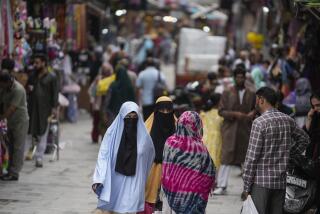Unrest in Kashmir
- Share via
Bharat Wariavwalla, in his article “Kashmir Violence Reignites India-Pakistan Tensions” (Opinion, Feb. 11), has made a number of unfounded allegations against Pakistan.
To begin with, the writer states that “the union of predominantly Muslim Kashmir with India is regarded by Indians as symbolizing the unity of their . . . country.” This makes it sound like a voluntary union which it is not: The Kashmir valley continues to be occupied by Indian troops, and its absorption into the Indian union is illegal. There are several U.N. Security Council resolutions calling for a plebiscite to determine the will of Kashmiris. India, which first agreed to abide by this logical and democratic formula, backed out and has never permitted the people of Kashmir to exercise their right of self-determination.
Wariavwalla then states that most Indians would, “for security reasons,” tolerate a level of repression in Kashmir that they would not accept elsewhere. I would respectfully submit that the reason for the severity and ruthlessness of the Indian crackdown is that the majority of Kashmiris are Muslims.
He goes on to state that voter turnout in the recent elections was 2% due to the people’s alienation from politics. He conveniently omits the fact that this refusal to participate in the (Indian) elections was the result of a boycott call issued by the Jammu and Kashmir Liberation Front. In fact, the response to this appeal was an impressive show of unity.
Turning to Wariavwalla’s various accusations of Pakistani instigation of the popular uprising in Kashmir, he is merely echoing similar charges leveled by the Indian government. Neither party has produced any evidence to substantiate these allegations. The fact is that Pakistan has, since the partition of the subcontinent in 1947, been advocating the Kashmiris’ right to choose their own future: to join India, Pakistan or opt for complete independence. This principle has been enshrined in several Security Council resolutions on Kashmir. But while Pakistan has extended moral, political and diplomatic support to the people of Kashmir in their struggle, the government is neither arming nor training Kashmiris. Their fight is their own, and recent events in East Europe have taught us that ultimately nobody can win freedom for somebody else.
But I agree with Wariavwalla when he says: “Neither side wants a fight, but the situation is volatile enough to give rise to miscalculation.” I suggest the way out of this impasse is for India to abide by the Security Council resolutions and permit a free and fair referendum.
IRFAN HUSAIN
Minister of Information
Pakistan Embassy
Washington, D.C.
More to Read
Sign up for Essential California
The most important California stories and recommendations in your inbox every morning.
You may occasionally receive promotional content from the Los Angeles Times.













